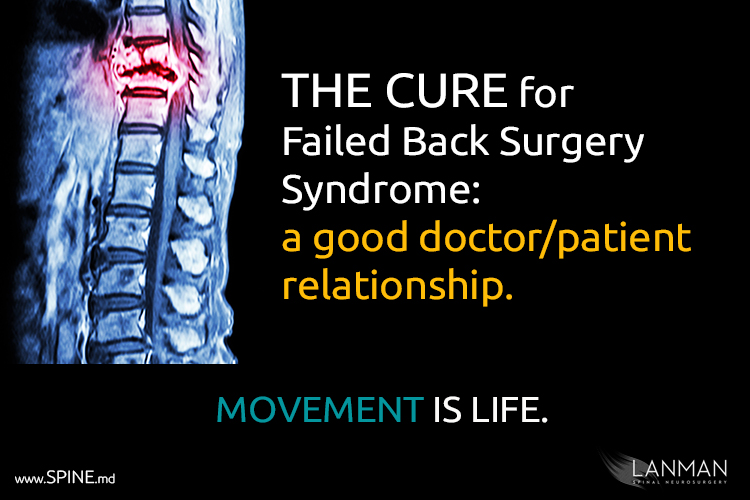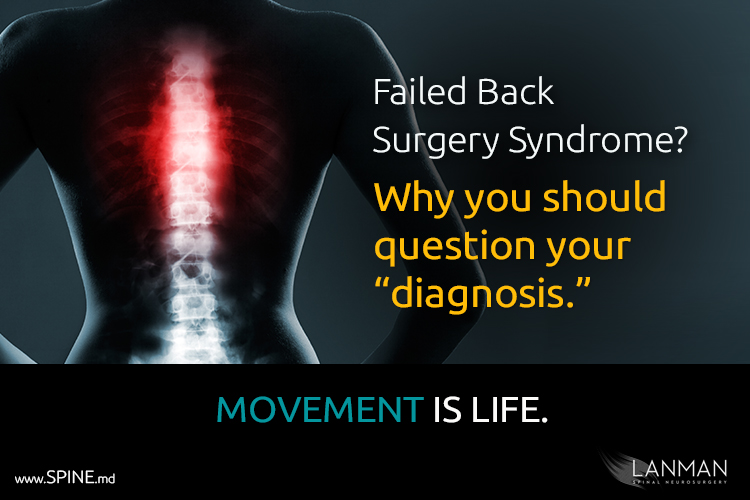A friend of mine who keeps track of all things Internet told me this statistic which I thought was pretty significant. About 85% of Americans use the web to investigate the status of their health. I have said before that I applaud this trend, and I hope it only grows stronger. I say this because in my 25 years as a neurosurgeon – and from the perspective of my private practice in Beverly Hills and as an affiliated surgeon with Cedar-Sinai Medical Center in Los Angeles – knowledgeable patients are far easier to treat.
In my experience with treating patients with spinal disorders and chronic back and neck pain, a patient armed with their insight and understanding of treatment and procedures tend to deal with surgical procedures better and heal faster. They also tend to follow through with my prescriptions and experience far fewer problems post-operatively.
Let’s say that you’re among the 85% of investigative patients. You’ve seen other articles about FBSS. You found this article expecting to find out more about a “diagnosis” popularly known as Failed Back Surgery Syndrome, or FBSS.
The first thing that I’ll say about FBSS – a point that cannot be overstated is that a diagnosis is not a diagnosis until it is specific. The problem is the popularity of labels like FBSS often confuses an issue when a patient condition is difficult to diagnose. More often, when I see a patient who tells me that they’ve been diagnosed with FBSS, I discover underlying problems with a previous surgical procedure or a situation that was previously missed. I’ll get into more details in a moment.
My second point: Failed Back Surgery Syndrome is not a valid “syndrome” – never was. I say this because FBSS does not fit the usual profile of what defines true syndromes. No pathogenesis is clinically linked to the condition. While there may be several symptoms that appear to be correlated, usually the symptoms themselves point to other causes that have either been misdiagnosed or missed altogether.
For instance, many patients with the FBSS diagnosis in hand will cite “scar tissue” as the probable cause. In my practice of 25 years, I have only seen two patients that have actual true granulation scar tissue formation that ultimately proved to be a causing symptom. Two patients from literally thousands.
However, in all other cases, I discover with more in-depth postoperative evaluation that may include CAT scans or MRIs that indeed epidural fibrosis is not the cause of their pain. In nearly all of these cases, there is some residual fragments of disc material or bone, possibly a new herniation, a nonunion or poor healing graft where the surgery was performed, subsidence, or angulation changes to the vertebra that causes additional adjacent stresses to other areas of the spine.
In other words, the odds that scar tissue is the cause of ongoing post-operative pain is so infinitesimally small that it is a footnote to different, and more likely, causes.
Here is where the details of my previous point come into focus. There are four major types of spinal surgeries that are performed: laminectomy, discectomy, spinal fusion, and artificial disc replacement. Each of these procedures carries a certain degree of risk. The risk level increases or decreases depending on three essential factors in the diagnosis process:
- The patient’s ability to describe what is going on with their bodies. That’s why an informed patient is so important – especially for diagnosing back and neck pain.
- The physicians’ ability to get as much information about the patient as possible. What I mean is that a physician must know something about the patient’s daily routine, habits, even sleeping position and cell phone use!
- A healthy patient and doctor relationship. Here’s where the physician encourages two-way communication with a willingness to listen. I have found that patient does best when they are encouraged to enrich an open discussion with relevant information I need to form an informed diagnosis.
A professor of mine back in medical school once said that diagnosis is only as good as the process. After seeing dozens of patients who have walked into my office with this diagnosis, I have concluded that FBSS is a fallback position that covers an otherwise improperly evaluated situation.
If more doctors took the time to form good relationships with their patients, I believe that popular labels like “failed back surgery syndrome” would quickly fade away. In fact, I’ll take one step further and say that the true syndrome is not medical at all – it’s our attention span and our willingness to understand what’s going on in our bodies.
It takes time, and a good conversation, to heal and be greater than better.







